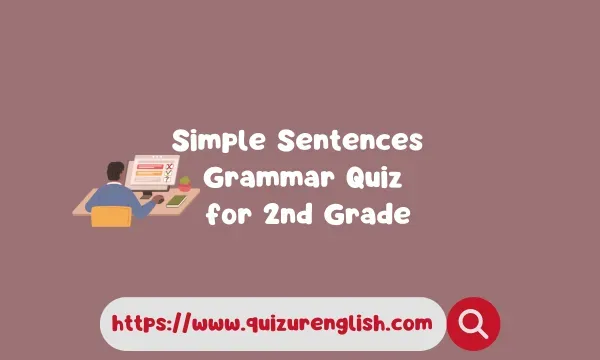Simple Sentences Grammar Quiz for 2nd Grade
Introduction:
Does your 2nd grader struggle identifying complete simple sentences? This interactive blog post offers a fun multiple-choice grammar quiz to help them master simple sentences. Through clear explanations, vivid examples, and engaging activities, young learners will grasp how simple sentences express a complete thought. With practice spotting and writing simple sentences, students will gain confidence understanding these foundational sentence structures. Let’s make grammar fun!
Remember!
Let’s learn about simple sentences!
A simple sentence expresses one complete thought with a subject and predicate. The subject tells who or what the sentence is about. The predicate tells what the subject does or is. Simple sentences start with a capital letter and end with a period.
For example:
- The girl is laughing. (The girl is the subject, laughing is the predicate)
- The cat plays with string.
- I like pizza.
Let's practice! Tell me if these groups of words are complete simple sentences or fragments:
- The dog - Fragment
- The dog barks loudly. - Simple sentence
- Loudly barks the dog - Fragment
Great job identifying complete simple sentences! With more practice, you'll be a simple sentence pro in no time.
Simple Sentences Grammar Quiz for 2nd Grade
For 1-4, Read each sentence. Select the bubble to tell if the underlined words are the naming or the telling part of the sentence. Some of the underlined words may not be the whole part.
For 5-8, Select the bubble to choose a naming or telling part that makes a sentence.
FAQs
Frequently Asked Questions: Simple Sentences Grammar - 2nd Grade
Q1: What is a simple sentence in 2nd-grade grammar?
A1: A simple sentence in 2nd-grade grammar consists of a subject (who or what the sentence is about) and a predicate (what the subject is doing). It expresses a complete thought.
Q2: How do you identify a simple sentence?
A2: Look for a subject and a predicate. The subject tells who or what the sentence is about, and the predicate tells what the subject is doing.
Q3: Can you give an example of a simple sentence?
A3: Certainly! "The cat sleeps." This is a simple sentence because it has a subject ("the cat") and a predicate ("sleeps").
Q4: What's the role of punctuation in simple sentences?
A4: Simple sentences end with a period. The period signals the end of the sentence and helps separate it from other sentences.
Q5: How can I help 2nd-grade students understand simple sentences?
A5: Start with familiar subjects and actions. Use clear examples and encourage students to create their own simple sentences.
Q6: Can a simple sentence be long or short?
A6: Simple sentences can be both short and long. What matters is that they have a subject and predicate to express a complete idea.
Q7: How do simple sentences differ from other types of sentences?
A7: Simple sentences are the foundation. They have one subject and one predicate. Other types, like compound or complex sentences, combine multiple ideas.
Q8: Are there resources to practice simple sentences?
A8: Yes, look for 2nd-grade grammar workbooks or online platforms that offer exercises and activities focused on creating and identifying simple sentences.
Q9: Can I use simple sentences in creative writing?
A9: Absolutely! Simple sentences are essential in creative writing. They provide a clear and direct way to convey ideas.
Q10: Why are simple sentences important for language development?
A10: Simple sentences help students grasp basic sentence structure and develop strong communication skills. They are building blocks for more complex writing.
Resources
- "Scholastic Success with Grammar, Grade 2" by Scholastic
This resource offers practice exercises and engaging activities to help 2nd-grade students understand and construct simple sentences. - "Grammar, Grade 2 (Skill Builders)" by Carson-Dellosa Publishing
This workbook provides lessons and activities specifically tailored to 2nd-grade grammar skills, including simple sentences. - "Grammar and Punctuation, Grade 2" by Evan-Moor Educational Publishers
Evan-Moor's workbook covers various grammar concepts, including simple sentences, in an interactive and comprehensive way.

